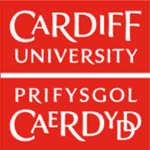

She/Her/Hers/Herself
Website: https://sway.cloud.microsoft/xuG5V9cx8lQL6BTY?ref=Link&loc=play
Start date: October 2021 (Full time)
Award: Collaborative
Subject Pathway:
Education
Thematic Cluster:
Language, Learning and Behaviour Cluster
In partnership with:
Towards a racially diverse education workforce in Wales
In Wales, minority ethnic teachers only make up 1.3% of the education workforce (Education Workforce Council 2021), which does not reflect the diversity of the nation, where 12.9% of pupils are ethnic minorities (StatsWales 2021). Minority ethnic pupils in Wales are therefore unlikely to be taught by a teacher who looks like them.
My research aims to investigate the experience of ethnic minorities in the teaching workforce in Wales, which will help inform policies to bring more racial diversity to the sector and foster an anti-racist education system as a whole. My research is grounded in the Critical Race Theory (CRT) framework, which foregrounds and accounts for the role of racism at education institutions, centres the experience of ethnic minorities, and rejects the deficit narrative that blames racial inequalities on deficits within ethnic minorities.
My MSc dissertation focused on the experience of Initial Teacher Education (ITE) for minority ethnic trainee teachers in Wales, who only account for 4.8% of all trainee teachers in the nation in 2020/21 (StatsWales 2022). My research questions were:
1. What are the possible manifestations of racism in the experience of minority ethnic trainee teachers in Wales?
2. How do minority ethnic trainee teachers in Wales respond to and resist racism within educational institutions?
Through interviews with 10 teachers who completed parts or all of their ITE in Wales between 2017 and 2022, the research found a persistent level of institutional racism in ITE, reflected in the exclusion and hostility faced by minority ethnic trainee teachers but also in institutional policies and practices, such as the Eurocentric ITE curriculum that excludes the perspectives and experiences of ethnic minorities. This initial research project also shed light to the strengths and contributions of minority ethnic teachers to the education sector, especially in supporting one another through established and informal networks.
Inspired by my MSc dissertation, my PhD project will focus on the role of minority ethnic educator networks and their role in the ambition to diversify the education workforce in Wales. In a multi-case study design, I will conduct ethnography of some of these networks in Wales with the aim to answer the following questions:
1. What are the ways in which racialised educators in Wales advance inclusion and racial diversity of the education sector in Wales through their communities?
2. What are the factors that enable communities established and participated in by racialised educators in Wales to succeed in advancing racial justice in the education sector?
3. What are the factors, either from the communities themselves or other stakeholders (e.g., policymakers and school leaders) that undermine the work and impact of racialised teachers’ communities?
This study employs an ethnographic approach, which includes:
- Observations of events and activities (e.g., meeting and support group) organised by and participated in by minority ethnic educators in Wales.
- In-depth interviews with educators
- Visual/material objects (e.g., leaflets, drawing, educational materials, etc…)
This research is in collaboration with Race Council Cymru, the Education Workforce Council, and the Welsh Government.
Research Impact
External positions
2024 – Present: Communication Officer at BAMEed Wales (voluntary).
2022 - 2023: Black and Ethnic Minority Officer at Cardiff University Students' Union (voluntary).
Scholarships and awards
2024 – All Means All! Summer School scholarship. Erasmus+ funded project at Bremen University, Germany. During the summer school, I co-author a chapter on inclusive curriculum making in the project’s open-access textbook on inclusive education.
2023 – Cardiff University’s Enriching Student Life Awards. Shortlisted for the SU President’s Award and nominated for the Champion for Equality, Diversity, and Inclusion Award.
Conferences, symposia, and workshops
2024 - "Decolonising by addressing universities’ complicities with oppressive institutions". Presentation at the Reimagining higher education: Journeys of decolonising conference 2024. Institute of Education, UCL, London, UK.
2024 – “Antiracist Education and the Role of Change Makers, Community, and Friendships”. Poster at Welsh Graduate School for the Social Sciences (WGSSS) Launch Event. WGSSS, Cardiff, UK.
2023 – “A critical race theory analysis of Initial Teacher Education in Wales”. Presentation at Breaking Boundaries Conference. Cardiff University, Cardiff, UK.
2023 – “Utilising Student-Staff Engagement fora to Advocate for Decolonisation”. Presentation at Building Institutional Networks in Response to Decolonising the Curriculum Workshop. University of Glasgow, Virtual.
2023 – “Racial inequality in Education and how you can fight against it as a student leader!”. Workshop at Student Leadership Conference. Cardiff University Students’ Union, Cardiff, UK.
2022 – “Decolonise Educational Studies”. Presentation at Employment Research Unit Conference. Cardiff University, Cardiff, UK.
Biography
I am a doctoral researcher in Education at Cardiff University, with expertise in anti-racism and equality in education. I have extensive experience of working in educational charities and campaigning to influence anti-racist and inclusive educational policies.

